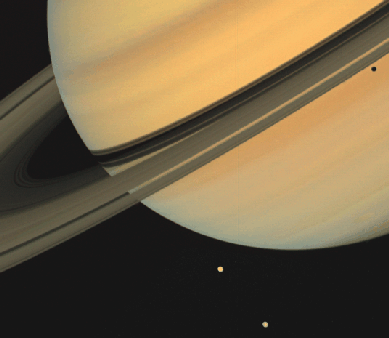Astronomy Picture of the Day
Discover the cosmos!
Each day a different image or photograph of our fascinating universe is
featured, along with a brief explanation written by a professional
astronomer.
March 18, 1996

Saturn with Moons Tethys and Dione
Credit:
Voyager 1,
JPL,
NASA
Explanation:
Saturn and two of its larger moons -
Tethys and
Dione - were photographed by the
Voyager 1
spacecraft which flew by the planet in November of 1980.
This picture gives an indication of
Saturn's extensive ring system, which
can be seen casting a shadow on the planet, as does Tethys.
Saturn's rings are composed of many chunks of ice ranging in size
from a pebble to a car. The rings have several large gaps, the largest of
which is clearly visible in the picture and is named the
Cassini
Division, after its
discoverer.
Saturn
appears brighter than most stars in the sky,
and its rings can be discerned with a small telescope.
A new spacecraft -
Cassini - will visit
Saturn
and is currently scheduled for launch in 1997.
Information:
The
Scale of the Universe Debate in April 1996
Tomorrow's picture: The Ion Tail of Comet Hyakutake
| Archive
| Index
| Search
| Glossary
| Education
| About APOD |




Authors & editors:
Robert Nemiroff
(GMU) &
Jerry
Bonnell (USRA).
NASA Technical Rep.:
Sherri
Calvo.
Specific rights apply.
A service of:
LHEA
at
NASA/
GSFC




